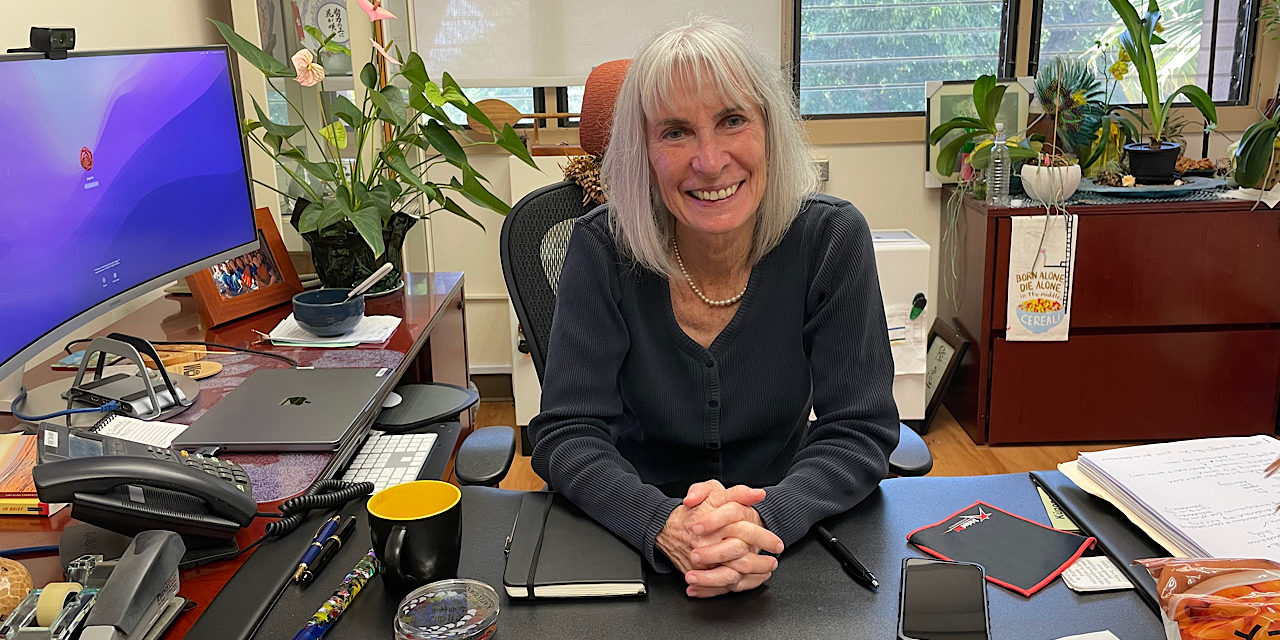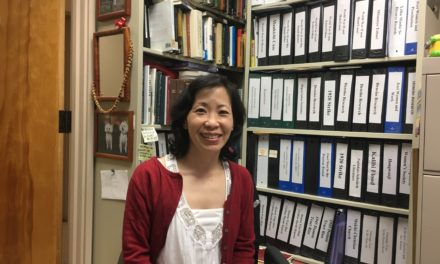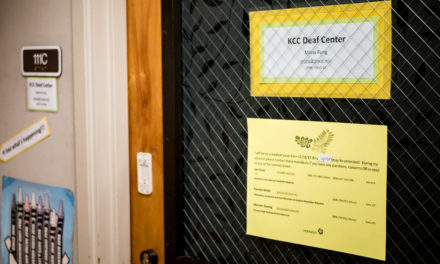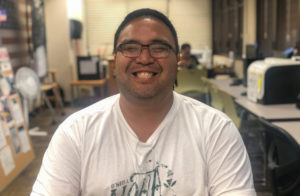Chancellor Louise Pagotto will be stepping down from her position at the end of next semester. (Photo by Shawna Takaki)
By Shawna Takaki | Staff Writer
Kapi’olani Community College Chancellor Louise Pagotto announced on Apr. 21. that she will be retiring from her position after a more than 30-year career at KCC at the end of next semester on Dec. 30. But at the end of this semester, the chancellor found time to speak with staff writer Shawna Takaki about her retirement, KCC and more. [Note: This interview has been lightly edited for content and style.]
Takaki: You’ve spent almost 33 years working at KCC. What do you think is special about KCC in particular?
Pagotto: Well, I say the dedication of the faculty and staff is really important. We have folks who really care about the students, providing quality instruction, and providing excellent service to the students. That’s been important to me. Also, folks are always looking for new ways, innovations to better deliver their programs. And that makes it interesting. It’s challenging, too, because people are changing all the time. But it’s interesting because things move and things happen. And finally, because the students are so smart. I listen to student presentations and I watch how the organizations work, and I am so impressed by the all of what they do. It’s amazing to me. Like you.
Takaki: Thank you. So how has KCC changed since you’ve started here back then?
Pagotto: It’s gotten much more technological. [It] didn’t have all this kind of online stuff, and that’s true for everybody. We have programs that we offer today that weren’t here when I first started. So there are many more options for students. More grants are available, and more grants have allowed us to do more for students, like stipends. Title III grants have given us tremendous opportunities for renovation. So the buildings are different and the functions are different. There’s been huge changes in 33 years.
Takaki: Amongst those changes, what are you most proud of when it comes to your achievements over these past 33 years?
Pagotto: I’m proud of the role that I played in the Undergraduate Research Experience being made available to students and being able to be compensated for that work. I’m proud of the work I did with others. … Again, I didn’t do URE by myself but with others. Also, grants, bringing millions of dollars to the campus, working with others. I’m happy with the partnerships that we’ve created amongst the system. I’m proud of one assignment I did in linguistics. I brought that course to the campus, so I’m proud of that too. And I was able to, as an administrator, direct funding to professional development and also being able to coordinate the Wo Learning Champions for over 20 years, which is funded by a philanthropist, [the] Wo family. And we are across the system of community colleges, and the faculty and staff engage in professional development. So my commitment to professional development is something that I think I’m very proud of.
Takaki: So what are your favorite memories from your time at KCC?
Pagotto: Oh, boy. Favorite memories. Some of the meetings that I was at, where we laughed about things. Not necessarily what was going on in the meeting. Some commencements have brought me to tears. Those are very memorable to me. I think some of the activities that we’ve done, working together, doing barbecues with the other administrators, serving ice cream to the students … so the fun times. Not the hard times, but the fun times.
Takaki: How has your career been as the chancellor of KCC?
Pagotto: It’s been a difficult six years. We had a challenge when I first came on in 2016. The campus had gone through a really tough time with the prior chancellor [Leon Richards], and so I was given the job of helping to stabilize the campus after a really, very difficult time. Then we had two years of really not-great budget situations, then we had two years of COVID, so it’s been rough. But all through that, I’ve been lucky to have faculty and staff who are so committed to the college that we were able to get through those three different bad patches and still offer what I think is the best two-year program in the state.
Takaki: Could you tell me more about how COVID-19 was as the chancellor?
Pagotto: It was really hard. It continues to be hard. In the early days a lot of it was that we didn’t know what we were doing. Every day was different, every day the situation changed. Directives from the CDC, the U.S. president. … We had to monitor very carefully what was going on. Arrangements, what do we do in this situation, what we do in that situation. How do we keep our employees safe, how do we keep the students safe? So it was very difficult because things were changing so much. We were in meetings every day, trying to keep track and making sure we were doing the best we could for the students and the employees on the campus. That continues today. I’m still meeting three times a week with the other administrators. I’m still meeting three times a week with the other chancellors. … We continue to have those conversations, because, again, we had to make adjustments. Every semester we’ve had to adjust to the external situation, so it’s been very challenging and very difficult because I didn’t always have answers.
When folks asked “what about this?” and “how is this going to be?” I didn’t have an answer because nobody had the answer. For someone in a leadership position not to be able to say, “Well, this is what we’re going to do,” and always have to say “we don’t know, it hasn’t been decided, and it isn’t my decision, so I don’t know,” it was very difficult. And very difficult for the campus as well to be in that prolonged uncertainty. I think it’s coming to somewhat of an end. We kind of know what it’s going to be going forward, but then again, we’ve been fooled by this virus before. “Oh yeah, we’re good, everything’s going to be okay,” and then, it always correlated with the start of the semester. “Oh, big spike, oh no, we can’t do that. We’re going backwards.” So, that uncertainty, especially the prolonged uncertainty, was very difficult.
Takaki: COVID was hard for everyone involved. … With all of that said, what do you want to do during your last six months at KCC?
Pagotto: I need to make sure we are done with our strategic plan so that the incoming chancellor has a blueprint for the next five years. There are some decisions and processes that have to be completed for the Culinary Institute of the Pacific. That needs to be taken care of before I leave. There needs to be some continuity for the Wo Learning Champions. That’s not the campus, but that’s one of the responsibilities that I have, so I need to take care of that. And I need to make sure that the campus budget and budget planning is ready for the next person.
Takaki: And how and why did you decide to retire?
Pagotto: I make the decision with mixed feelings, Shawna. I’m excited, because I’ve been in this job for this long, and on campus for this long. So it’s kind of exciting to think that I might have a different life in the next few years, because this has been my life for 33 years. So I’ll be leaving some very important relationships, so that’s going to be a challenge. I think, given my longevity here, I think it’s time for someone new to pick it up. Someone who has energy and is eager to take on some challenges. And I am sort of at the tail end of things. I think the college is in exactly the right place for that transition to happen. Couldn’t do it in the middle of a pandemic, couldn’t do it in the middle of a really bad budget situation, couldn’t do it after the prior chancellor left the college. So, I think things are in a good place now, and I can let someone else take over the campus when it’s in a good place and not a bad place.
Takaki: What do you want to do during your retirement?
Pagotto: Okay, well everyone says they’re going to clean their house so I want to do that. I also want to travel, since travel is possible. And my plan is to go to Windward Community College and do a certificate of achievement in Veterinary Assisting. So, 1 year of program, and that’s what I want to do. I want to learn how to care for animals better so that I can take care of people’s pets when they’re traveling and be a pet sitter. I’m also going to volunteer at the zoo to take care of animals.
Takaki: On that note, what does the KCC community not know about you after almost 33 years here?
Pagotto: I don’t know that there’s anything they don’t know about me by now. That’s a good question. I would say, what do they not know about me? They might not know how important my family is to me, because I live so far from them. I’m from Montreal, so my family is all from Montreal. I’ve lived in Hawai’i since 1980, so it might look like my family doesn’t matter, since they’re so far away, but they do. Maybe people don’t know that about me. Everything else about how I am and who I am, I’m pretty sure everybody knows. Too much, probably.
Takaki: And going forward, what do you wish for KCC in the future?
Pagotto: Oh, much success. And I wish for more students to come to this campus because of the experiences they can have here. I wish for the faculty to feel supported and to always strive to be better. I wish for employees to, again, feel supported and take pride in their work. I wish for Kapi’olani Community College to grow in the eyes of the community as a source of the best quality graduates in all the programs, because all of it is already happening now and I sometimes feel the recognition is not there.
Takaki: And how do you think that the next chancellor could work on that?
Pagotto: I think it’s about making sure that our message gets sent through all the various channels. Now we have access to social media, which we didn’t have before, and we are working on it. But I feel like the next chancellor can do better than I did with getting the message out about the quality of our programs and graduates. I feel we can do a better job of engaging the graduates to be part of that message too, by creating a stronger alumni association and allowing our alumni to shine and to bring the message to everyone about the quality of the programs.
Takaki: Yes, that would be wonderful. And what would be the final message you’d like to impart on the students, faculty, and staff of KCC?
Pagotto: I think it’s that this campus is a very special place. I think the dedication of the faculty and staff who work here is very clear, and I think that if we are true to Queen Kapi’olani’s message, “Kūlia i ka nu‘u,” it cannot go wrong if you always strive for excellence. And that’s the message all of us should carry, all of us should aim to complete. Because if you strive for excellence, you will achieve it.






